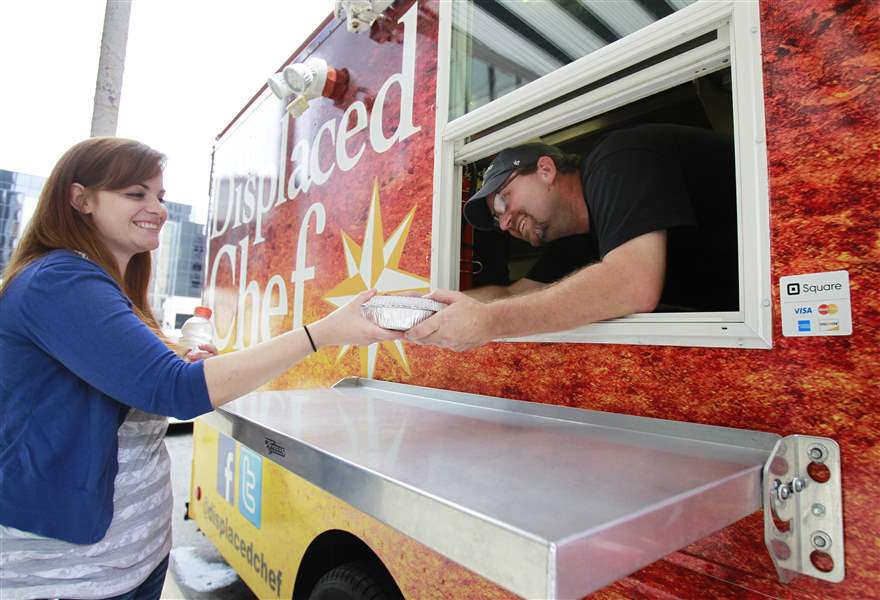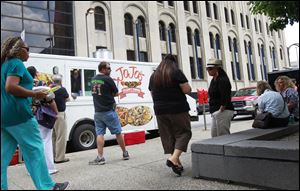
Toledo ponders food-truck permits, regulations
Parking close to brick-and-mortar restaurants an issue
6/30/2014
Laura Ness is served by John Ray from The Displaced Chef food truck on St. Clair Street downtown. The pilot program for food trucks in Toledo began last year at the request of then-Mayor Mike Bell.
The Blade/Isaac Hale
Buy This Image

Laura Ness is served by John Ray from The Displaced Chef food truck on St. Clair Street downtown. The pilot program for food trucks in Toledo began last year at the request of then-Mayor Mike Bell.
Under pressure to protect downtown restaurants from mounting mobile competition, Toledo City Council is being asked to approve rules to regulate the growing food-truck industry.
Mayor D. Michael Collins presented legislation to council last week that would restrict operations of mobile food vendors on streets in the downtown business district and other neighborhoods and create zones in which the businesses could operate.
Council is to vote Tuesday on the new rules, which include requirements that food-truck operators apply for permits that could cost up to $1,000 per year, obtain $1 million liability insurance, and not park within 100 feet of entrances to brick-and-mortar restaurants.
Joel Mazur, the mayor’s assistant chief of staff, said the proposal is a response to complaints from restaurants in the downtown business district about the rising kitchen-on-wheels operators.
“It is more or less to level the playing field,” Mr. Mazur said at council’s agenda review meeting.
The proposal would create “competitively” restricted zones for food trucks to operate on North St. Clair Street at Levis Square between 9 a.m. and 4 p.m. Tuesdays and on Michigan Street at the Toledo-Lucas County Public Library on Wednesdays, also from 9 a.m. to 4 p.m.
“Nighttime” designated zones, between 10 p.m. and 3 a.m., would include Adams Street between 12th and 21st streets; Superior Street between Monroe Street and Jefferson Avenue; St. Clair between Washington and Monroe streets; and Huron Street between Washington and Monroe streets.
Two other daytime zones would allow food trucks during the work week between 9 a.m. and 4 p.m. near the Lucas County Courthouse on Ontario Street and on Constitution Avenue, near Toledo Municipal Court.
Mr. Mazur said the ordinance would put Toledo in line with Ohio’s other large cities in regulation of mobile food vendors.
Akron, Cleveland, Columbus, and Cincinnati, which Toledo used as a model for its proposed law, have annual mobile food vendor permit fees, ranging from $500 to nearly $2,000, he said.

Customers wait by JoJo’s food truck on St. Clair Street downtown. Vendors pay $3 for each spot used by their truck or trailer.
Because of efforts of the Downtown Toledo Improvement District, prime parking spaces on St. Clair at Levis Square are reserved for food trucks, catering to the downtown lunch crowd, and within several hundred feet of brick-and-mortar restaurants.
Vendors pay $3 for each spot used by their truck or trailer. The pilot program, which began last year at the request of then-Mayor Mike Bell, has become popular for both vendors and downtown office workers.
Matt Salgado, co-owner of Displaced Chef, which is among the regular mobile businesses at the square, said the regulations — especially the $1,000 permit fee — would be an unfair burden that will only serve to protect downtown’s brick-and-mortar restaurants.
“We are in the same business as they are and we are trying to do the right thing. My business is just like having a restaurant. You have to change things to stay above the rest of the competition. If you want to compete you have to step up your game,” he said.
Ed Becyznski, the owner of Blarney Irish Pub and Focaccia’s Deli in the HCR ManorCare building, said he supports having vendors on the street, but wants it limited to one day a week because of the economic impact they have on the eateries.
“I am not against them. I think it is good to have variety. But we have to make it work for everybody,” he said. “When you sit at the same spot every day, instead of moving around, you are affecting the same places.”
Councilman Michael Craig agreed that a level playing field is needed to balance the concerns of the “fixed-base” restaurants and the growing mobile food business.
While both are important to downtown revitalization, Mr. Craig said restaurants have to balance fixed costs and slow periods during the winter that make the booming summer months important to their profit margins.
“The legislation is designed to make the vendors move around so they are not preying on a certain restaurant,” he said. “You have to level the playing field and spread this around. I am not totally against the mobile vendors, but we have to make it work for everybody.”
City council will discuss the proposal at 2 p.m. Tuesday during a committee of the whole meeting, with further action scheduled at the 4 p.m. council meeting.
Contact Mark Reiter at: markreiter@theblade.com or 419-724-6199.